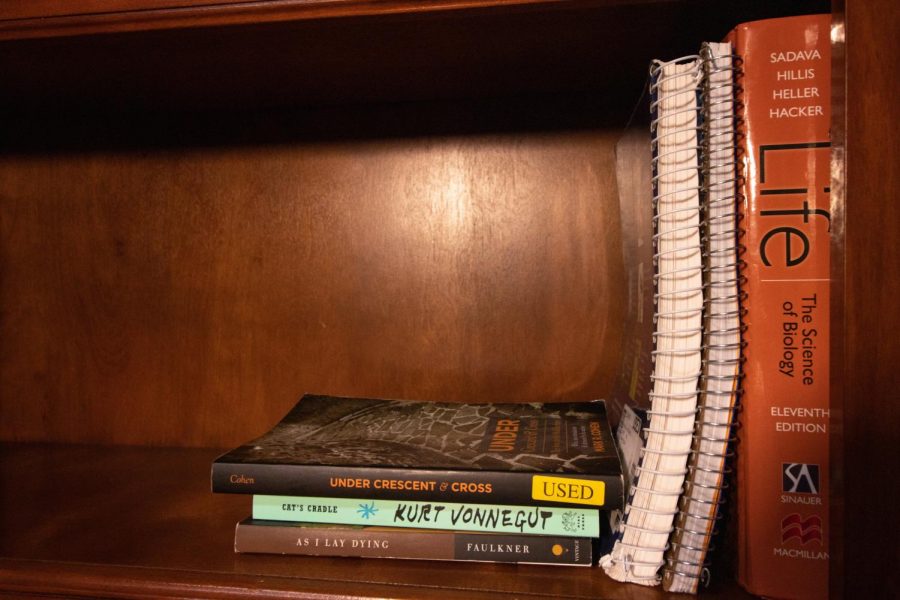UPDATED: Belongings Left With No Return
Residents’ Possessions Stranded in Dorms
Many students were forced to leave some of their belongings behind, such as textbooks and clothes, after rushing out of the dorms. It is still unclear when those items can be retrieved.
April 28, 2020
UPDATE: On Friday, May 8, ResLife sent an email to residents informing them of the updated procedure for retrieving belongings left on campus. Included in the email is an online registration form featuring various time slots ranging from May 17 to June 28, with a maximum of 75 students permitted for every time slot. The move-out period for McMahon Hall begins on May 22 and will continue through June 30. For McKeon Hall, the move-out period extends from May 17 to June 28. Students who are unable to pick up their belongings are also encouraged to fill out the form.
The last time most Fordham students saw their dorms and all the belongings within them was the middle of March when the university urged all residents to return home. On March 9, the week before spring break, the Office of Residential Life (ResLife) sent an email encouraging all residents to vacate the campus until the end of the month.
On March 13, the university decided to cancel all face-to-face instruction and ResLife emailed students again to dissuade them from returning to campus. Many students left their belongings, including textbooks and everyday items, as they expected to return to campus eventually. Instead, Fordham has now been emptied of everything except abandoned student belongings.
Nearly a week later, ResLife emailed residents a form to sign up for pickup anytime from March 30 to May 17. By providing a large window of time and allowing students to arrive in groups, ResLife hoped to promote social distancing. Due to Gov. Andrew Cuomo announcing a lockdown on New York City, ResLife could not follow through with this plan.
In April, the Office of the President issued two updates via email including information about student belongings on campus. The first email was sent on April 7, reminding students that Cuomo extended the New York State on PAUSE order to April 29, and barring students from returning to retrieve their items. Another email was sent on April 24, noting the further extension of the PAUSE order until May 15 and reiterating the uncertainty surrounding the question of reopening.
Danielle Kezeli, Fordham College at Lincoln Center (FCLC) ’22, is currently residing in New York City without the ability to return to Fordham for her belongings. Although this poses a problem for her, given the textbooks and clothing she has left behind, she supports the university’s decision to bar students from returning.
“I do want my belongings back, but I consider our safety to be the highest in terms of importance,” she said. “Personally, I would put the blame more on myself. Since I’m closer, I should have waited another day for my parents to bring whatever was necessary so that I could take everything away.”
Kezeli said she would have liked more communication from Fordham and ResLife regarding the status of student belongings. She mentioned that she wanted fewer emails about virtual events and more consistent coronavirus updates to keep students in the know.
Raquel Arabalo, FCLC ’22, is currently in California and left the majority of her possessions behind due to the rush of packing up for departure the first time Fordham asked students to return home. Although she left some of her schoolwork and essential items behind, she appreciates not having to pay for storage to keep her items safe.
“I think May 15 is a little too soon. With the numbers in New York, I really don’t feel comfortable going back. I don’t have family there, so I wouldn’t have a place to stay and would probably have to pack everything up in a day,” Arabalo said.
Arabalo’s mother has pulmonary fibrosis, so she said returning to New York to gather belongings would not have been worth the risk of potentially catching and carrying the coronavirus home.
Despite being extremely affected by the rush to move students out of dorms, Arabalo remains appreciative of Fordham and understands the measures that needed to be taken for students’ safety. Her main concern at the moment is how long her items can be kept in the dorms.
Eva Lin, Gabelli School of Business ’23, is originally from China but is currently staying with her roommate in Boston. Although 90% of her belongings were left at her dorm, she would not characterize her issue as urgent and would rather comply with New York City lockdown rules. However, the uncertainty surrounding belongings comes into conflict with her plans to eventually return to China.
“The biggest problem is that I’m going to China in June, so my items are probably going to stay there forever! Next semester, I’m not going to use Fordham housing because I am moving out, so I don’t even know when I’ll be able to get them back,” she said.
“I know we can’t go back, but I still want some information from Fordham because we are constantly wondering about this. Especially for us international students –– we need to go back to our countries sometime. If they don’t tell us when we can get our belongings back, we’ll keep wondering,” Lin continued.
On March 13, New York University issued a COVID-19 statement in which they assured students that their belongings would be shipped back to them if they were unable to pick them up themselves. Fordham did not offer the same services to their students, but discussions around alternative ways of sending possessions back to students are underway, according to Jenifer Campbell, associate director of ResLife.
“Presently, we await notification from the Governor and Mayor regarding when we can resume move-out activities. At the point when the University planned to close, we were outside of the window of opportunity for continuing move-out activities, but we have started discussion with a number of vendors,” she stated.
All three students stated that they would have liked the option of shipping their items back to them, but ultimately would not sign up for the service due to privacy issues and a general feeling of discomfort with strangers rifling through their possessions. There was a general consensus for more frequent coronavirus updates, with suggestions spanning from a few times a month to every week.















Shannon Stafford • May 6, 2020 at 10:45 pm
I take issue with the usage of the word abandoned. My son took the first flight we could get him out of New York to Tennessee. He took what he could carry but couldn’t possibly carry bedding, computer monitors, refrigerator, stereos, all his clothing and text books. These items weren’t abandoned. They were locked up for safe keeping until he returns. Our hope is that the university honors the safe keeping we’ve entrusted them with by locking the door behind him and that Barnes and Noble chills on their demand for book returns. How can we return a book that we don’t have access to? Their constant calls for reruns are insensitive, ignorant and just adds to the stress of the situation.